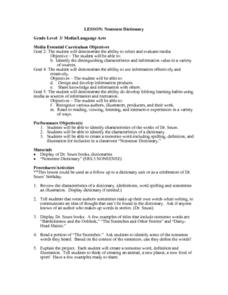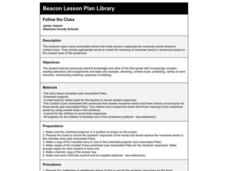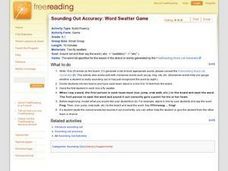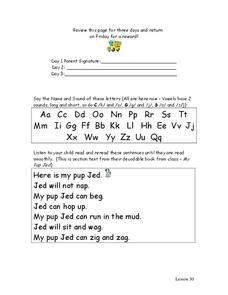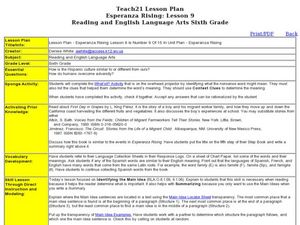Meadows Center for Preventing Educational Risk, University of Texas at Austin
Lesson 8 - Open Syllables
Just like scholars plug something in to close a circuit, they must plug a consonant onto a word to make closed syllables. Help learners distinguish between open and closed syllables with a series of activities that emphasize open...
Scholastic
Frindle Lesson Plan
"Who says a pen has to be called a pen? Why not call it a frindle?" Inspired by this quote from the award-winning novel written by Andrew Celements, this activity allows children to invent their own...
Curated OER
Latin Roots fin, sed, fer: Synonyms and Antonyms
Secondary etymologists assign synonyms and antonyms to six English words based on the Latin roots fin, sed, and fer. MyVocabulary.com ranks this as beginner-level, but the work is challenging. A 24-item word bank provides two acceptable...
Meadows Center for Preventing Educational Risk, University of Texas at Austin
Lesson 4 - Consonant Blends
Old, ild, ind, and ost may sound like a foreign language, but they actually represent common final consonant blends. Help learners recognize and pronounce consonant blends with step-by-step instructions, including scripted conversations....
Curated OER
"Jabberwocky": Inferring
Pupils, over an extended time, read and explain the nonsense words of Lewis Carroll's poem, "Jabberwocky". They infer the meaning of the poem using visualizing as well as decoding skills. While written for first graders, this is easily...
Curated OER
Sounding Out, Alien Word Game
Students invent words using a set of letters. For this Alien word lesson, students determine if the letters made a real word. Students record problem words in an activity log.
Curated OER
Sounding out accuracy, Build a Word
Students demonstrate how to build words. In this word study instructional activity, students play a game where they must choose two index cards from each bucket and put them together to build a word.
Meadows Center for Preventing Educational Risk, University of Texas at Austin
Lesson 5 - R-Controlled Syllables
Put on your pirate hat and get ready to teach r-controlled syllables. Learners practice using words that contain ar, or, er, ir, and ur. Instructors model how to decode words to isolate vowel teams, as well as combine r-controlled sounds...
Curated OER
Nonsense Dictionary
Third graders explore various media. They identify the characteristics of various sources and use that material effectively. Students identify the characteristics of Dr. Seuss' work and the characteristics of a dictionary. They create a...
Bright Hub Education
Jabberwocky - A Creative Writing Lesson Plan
Make some sense out of Lewis Carroll's famous nonsense poem "Jabberwocky." After reading through the poem, introduce the word portmanteau and send small groups off to alter the original poem.
Curated OER
Stackers Game for word fluency
Students create three letter words and decode for fluency and accuracy. In this fluency lesson, students use alphabet tiles to build words with the CVC pattern and read the word aloud. Students alternate turns by stacking one...
Curated OER
Follow the Clues
Students read a story and predict words that make sense in replacing the nonsense words based on context clues. Students choose appropriate words that will match the meanings of the nonsense words.
Curated OER
Analyzing Unknown Words
Middle schoolers analyze affixes and how they affect word meaning. In this language arts lesson, students use charts to construct and deconstruct words to find meaning.
Curated OER
Sounding Out Accuracy: Word Swatter Game
Students explore word fluency by participating in a language arts game. In this vocabulary identification lesson, students collaborate in two small teams, each armed with a fly swatter, in order to swat vocabulary words spoken by their...
Curated OER
The Creaky Door Says "ehhhh"
Study the long vowel sound /e/, as in a creaky door noise. Children repeat the sound and learn a chant. They use letters in letterboxes to make words with the /e/ sound before reading a book and writing a message about their favorite...
Curated OER
Nonsense Knows
In this poetry lesson, young readers discuss that poems can sometimes have silly words and made up people, places, and things. Students read and listen to silly poems then write a response poem to their favorite.
Curated OER
Review Letters and Words: 28
For this reviewing letters and words worksheet, students read sentences, read word chunks, determine syllables, and more. Students complete 5 exercises.
Curated OER
Word and Letter Practice #6
In this word and letter practice worksheet, students say the name and sounds of given letters, read simple sentences, practice reading sight words and practice "chunks" of words.
Curated OER
Word Structure
Students infer the meanings of unfamiliar words using context clues and knowledge of prefixes and suffixes. They identify vocabulary words as nouns or adjectives using context clues and suffixes. In addition, they decide the meaning of a...
Curated OER
Lesson Exchange: Is This A Real Word? (Elementary, Reading/Writing)
Young readers practice looking words up in the dictionary. This activity describes a simple, yet engaging, game that can be played as a whole-class activity.
Curated OER
Vowel Sounds
This plan aims to increase the reading proficiency of your fourth grade class. While no materials are provided, a list of activities to practice are included. Various activities include creating songs for short vowel sounds, using cue...
Curated OER
Using Context Clues
Teach your third graders how to find the meanings of words using context clues. Using this reading lesson, discuss how readers can find the meaning of a word by using the sentences around it. They then complete a worksheet in which they...
Curated OER
Esperanza Rising: Lesson 9
Sixth graders explore culture by reading a book with classmates. In this Hispanic history lesson, 6th graders read the story First Day in Grapes, and discuss the tough lives of migrant workers. Students answer study questions after the...
Curated OER
Words and Letters Practice #3
In this words and letters practice learning exercise, students practice naming letters and practicing sounds of given sets of letters, read simple sentences, and practice sight words.










